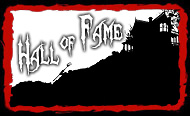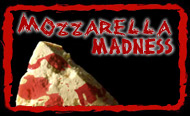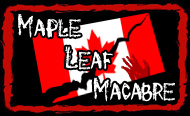
The Old Dark House (1932)
Studio: Cohen Media Group
Release date: October 24th, 2017
Reviewed by: Brett Gallman (@brettgallman)
The movie:
The twin columns of Frankenstein and Bride of Frankenstein have conspired to keep much of director James Whale’s other output in their shadows. Indeed, it’s easy to forget he was a workhorse for Universal in the interim years between those genre landmarks, churning out six films in four years, including the often overlooked introduction of The Invisible Man to the Monsters stable. Even more overlooked—largely because it was virtually lost for 30 years—is 1932’s The Old Dark House, Whale’s odd, slippery take on one of the era’s most overworked genres. While it isn’t quite an out-and-out spoof of those familiar tales involving lodgers in foreboding, unfamiliar homes, it certainly seeks to needle their conventions, all while Whale delivers his own wryly gothic sensibilities. The result is the rare film that actually manages to stand as an exemplary example of the very genre it’s upending: put simply, this is the ultimate old dark house movie, its title serving both as a goof and a definitive statement.
In the tradition, it starts on a dark, stormy night, one that’s terrorizing the bleak Welsh countryside, where a trio of travelers seeks shelter from the torrential downpour. As Phillip Waverton (Raymond Massey) bickers with his wife Margaret (Gloria Stuart), fellow passenger Roger Penderel (Melvyn Douglas) lobs sarcastic barbs from the backseat, adding to the chaotic scene. When the weary travelers spy a mansion in the distance, they’re all too eager to stop and ask for refuge. Nothing can stop them from doing so: not the mansion’s eerie, ominous appearance, nor the presence of a mute, sinister-looking butler (Boris Karloff). They’re hardly even fazed when Horace (Ernest Thesiger) and Rebecca Femm (Eva Moore)—the brother and sister who own the house—are hesitant about having visitors. Insistent on riding out this story, the three shack up with these oddball siblings, who are further aggravated when two more visitors arrive in the form of Sir William Porterhouse (Charles Laughton) and his chorus girl companion Gladys DucCane Perkins (Lilian Bond). Before long, everyone’s poking about the place, unwittingly uncovering long-buried family secrets that threaten to unravel the entire place.
A somewhat unspoken absurdity rumbles throughout The Old Dark House, and it’s fair to say it does so with even more subtlety now than it did upon release. By 1932, audiences would have been subjected to innumerous riffs on this theme, either in films, novels (like Benighted, which served as the source material here), and stage plays, putting them a bit more in on the joke, as it were. As such, there’s not much out-and-out winking, much less hyper-aware dialogue pointing out the absurdity of the situation, leaving the audience itself to note it. Of course it’s a bad idea for these travelers to even approach this forlorn house, much less bound right in—especially after catching a glimpse of ghoulish old Karloff, made up here to look like the archetypal sinister butler. He’s exactly the sort of ghastly greeter you should run away from—not casually waltz on by while you take up lodgings in an enormous, creaky house in the middle of nowhere.
Which is not to say the film doesn’t draw some attention to its humor. Certainly, the lighthearted banner between characters creates a bouncy, screwball vibe that runs counter to the ominous horror overtures. For much of its early-going, The Old Dark House feels like a snappy stage-play, wherein the characters exchange small talk in lieu of any overt plot developments. Garish personalities fill the screen, particularly Laughton’s vivacious, loquacious high society man, whose loud posturing compensates for a soul wounded by a tragic backstory involving a dead wife who was once shunned by the upper-class circles whose approval he now craves. His companion, too, puts on a lively front, and Bond shines as the film’s most radiant personality, not to mention a principal player in one of its notable subplots when a romance develops between Perkins and Penderel, a fellow weary, cynical traveler. While the hasty nature of their romance feels like a light jab at similar developments in other old dark house creepers, there’s something warm and sweet about these aimless souls finding each other amidst the eventual chaos that engulfs the Femm home.
In many ways, these three putting on acts that melt away within the walls of this creaky home is a wry, clever little compliment to the usual narrative that finds the house’s owners revealing themselves to be something they aren’t. And while the Femms are certainly cryptic about the entire contents of their home, they can hardly be considered to be something they aren’t. From the moment these unwanted guests arrive, the two can barely conceal their disdain at the thought of them, making them quite possibly among the most relatable haunted house hosts ever committed to the screen, at least for those of us (read: very much me) who are agitated by the very sight of anyone on our doorstep. Moore at least carries that fanatical strain one expects from a deranged family, but Hesiger’s Horace is a much more subtle, deadpan sort of creature. He seems every bit as weary as the folks he allows into his home and clearly possesses zero time for their shit. When Laughton excitedly sings the virtues and pleasures of eating roast beef, Hesiger sharply undercuts him with the suggestion that he should have a potato—with the implication being that this motormouth should just shut the hell up.
In many ways, it’s an exchange that captures the essence of The Old Dark House, a film that’s less about these country folk inflicting some sinister punishment on their guests and more about said guests just stumbling upon horrors on their own volition. Eventually, their curiosity gets the better of them, leading them to the unseen corners and floors of the house, at which point the film fully embraces its title’s genre. Not that it suddenly becomes soaked in shadows and fog, mind you: on the contrary, Whale has the place draped in gothic trappings throughout, with the titular house itself standing as a richly textured bit of gothic production design. Whale’s exaggerated shadow-play and choice of high, open space create an otherworldly atmosphere these travelers blissfully ignore as they begin to explore its various cracks, crevices, and hidden rooms.
What lurks behind those forbidden doors is the stuff of bewildering, psychotic horror, as the androgynous family patriarch (Elspeth Dudgeon, billed as “John”) croaks away to her unknown guests, rambling on about the family’s sordid history. More secrets lurk in other parts of the home, most of them residing with Karloff’s shifty butler. In re-teaming, Whale and Karloff are largely up to the same thing here, as Karloff’s sad, longing eyes hint at some kind of pain lurking beneath his deformed countenance. Where most would see nothing but a pitiful, possibly malevolent monster in Morgan, Whale and Karloff reveal something much more poignant and sad: it turns out this sad sack is an alcoholic longing to unleash Saul (Brember Wills), the family pyromaniac that’s been hidden away and only whispered about in hushed tones throughout the film.
By this point, you’ve all but forgotten that The Old Dark House is meant to be goofing on this genre. Like Scream, it has a clear affection for its target, so much so that instead of turning its nose up, it embraces the tropes and clichés. The wicked climax is a feverish display of pure, unhinged madness, especially once Brember drops his disarming façade: just when you think Whale is going to pull the rug out from under every genre convention by running counter to what you expect, it turns out that Saul lives up to his ominous reputation—and then some. Before you know it, he’s flashing a mad glimmer in his eyes and threatening to burn the whole place down, leading to a dramatic fisticuffs and a bewildering denouement that sees the Femm’s visitors dusting themselves off, leaving the house in tatters. A poor, weeping Morgan is forced to carry his beloved Saul’s body up the stairs, with neither reappearing.
The flighty nature of the film’s ending speaks to Whale’s playfulness here: where so many of these things are preoccupied with innocent travelers happening upon some unfathomable evil, The Old Dark House feels like the reverse. You can’t help but feel for the Femms, who basically have their lives upended by these careless interlopers, who find romance, excitement, and restoration in their overnight visit. Meanwhile, their hosts can’t usher them out quickly enough as a new day dawns, bringing the hope and promise that the next night won’t end with the house nearly engulfed in flames.
What a bizarre but wonderful film this is. Though it’s been forever destined to reside in the shadow of Frankenstein, it does its best to outrun it with its indelible characters, snappy dialogue, and its macabre exploration of repression. You can especially read quite a bit into the presence of Saul, a literally closeted character whose madness seems to be a symptom of his treatment more than anything. Despite its heightened, playful approach, The Old Dark House still treads on the threshold of classic gothic horror, which has its audiences confront the darkness of the unknown. Even if you do manage to obliviously emerge from the other side, you still have to endure a dark night of the soul—be it yours or your slightly maniacal host’s.
The disc:
Once on the verge of being lost to time, The Old Dark House was eventually rescued from obscurity, mostly thanks to the efforts of underappreciated auteur Curtis Harrington (Night Tide, Queen of Blood). His tale and a few more await on the Cohen Media Group’s stunning new Blu-ray release, which is sourced from a recent 4K restoration that gives this underseen film—which is billed here as Whale’s “chilling lost classic”—a new luster. Simply put, The Old Dark House looks gorgeous, with the transfer allowing Arthur Edeson’s striking photography to shine even more brilliantly than it did on the film’s previous DVD release.
Cohen has also ported over the extras from that disc, including a pair of audio commentaries. One boasts Gloria Stuart, while the other features Whale biographer James Curtis. Harrington appears in an interview to recount his efforts in recovering the film, which may still be lost to the annuls of time without him, however impossible that might sound given its pedigree. The film’s trailer and newly produced interview with Karloff’s daughter, Sara, rounds out the disc, which is accompanied by liner notes that feature a further illuminating conversation with Harrington.
Even if this disc didn’t boast such supplements, it’d be a more than worthwhile release simply because it puts The Old Dark House back in a position to be rediscovered all over again. While it’s certainly found a bigger audience on home video during the past 20 years, that legion is sure to grow, and deservedly so. The Old Dark House is a gothic masterwork whose wry, heightened sensibilities were ahead of their time, the herald of an unsung genius who often managed to find the humanity lurking within his tales of gods and monsters. comments powered by Disqus Ratings:








